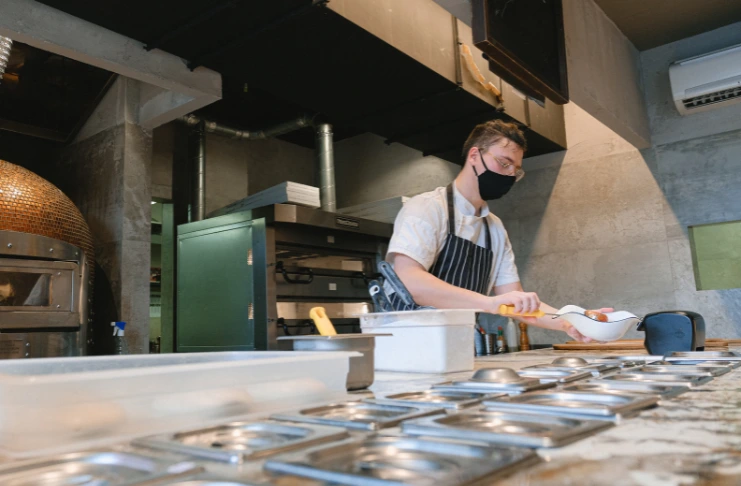You can have a sleek POS, a trending menu, and a hundred covers on a Friday night, but without a restaurant manager steering the ship, the whole thing can go sideways fast.
You heard it: Managers are the backbone of your daily restaurant management operations. They do more than “keep things running.” They juggle labor costs, guest complaints, supplier chaos, and the staff’s morale, often all before the lunch rush even hits. It’s a high-stakes role that directly affects your bottom line, brand reputation, and long-term growth.
Yet 49% of frontline managers feel so burned out in their work that they wish to quit, which says a lot about how demanding their role is.
This guide covers restaurant manager duties in detail. From daily checklists to responsibilities, it has everything you (or your GM) need to own this role fully.
What Does a Restaurant Manager Do?

The role of a restaurant manager is dynamic, multifaceted, and constantly evolving.
They are the core figure who ensures the seamless execution of daily operations and aligns the team’s efforts with the broader vision of the business. Their duties include managing the front-of-house (FOH) and back-of-house (BOH) operations, overseeing staff, and ensuring that customer service remains top-notch.
A restaurant manager may wear many hats wherever and whenever needed. For example, in smaller restaurants, they may be involved in hands-on tasks like customer service, inventory, and financial management.
Larger operations, on the other hand, may have more specialized roles, with them focusing on specific areas such as staff management, financial oversight, or quality control.
But no matter the size, the manager’s ultimate goal is to drive the restaurant’s success by delivering a high-quality experience to both customers and employees.
Core Duties & Responsibilities of a Restaurant Manager
Restaurant managers juggle a wide range of duties each day, from overseeing staff to managing finances and ensuring customer satisfaction. Here’s an overview of their core responsibilities:
1. Staff Management and Training

The quality of service in any restaurant is directly tied to the performance of its staff. As the team leader, the manager is responsible for hiring, training, and motivating employees to ensure the restaurant runs smoothly. Key duties include:
Hiring and Onboarding: A restaurant manager is directly involved in hiring the right staff. They interview candidates, assess their skills, and ensure they fit the team and the restaurant’s culture well.
Training Staff: The manager trains staff in various areas, including excellent customer service skills, food handling, safety procedures, and restaurant-specific protocols. They also ensure that staff continuously develop and improve their skills.
Managing Employee Schedules: The manager must create and manage employee schedules, ensuring the right number of staff are available during peak hours while balancing labor costs with the restaurant’s budget.
Handling Conflicts: Conflicts are inevitable in a busy restaurant environment. The manager resolves disputes between staff or addresses customer complaints quickly and professionally, ensuring the atmosphere remains positive.
INDUSTRY INSIGHT
| Understaffing, high turnover, and service inconsistencies often point to weak staff management—one of the restaurant manager’s most critical responsibilities. With industry turnover rates averaging 75% annually, effective hiring, structured onboarding, and performance-driven training are non-negotiable. A restaurant manager must optimize labor through smart scheduling, resolve team conflicts swiftly, and ensure that every staff member meets service standards. Moreover, in today’s competitive landscape, a consistent guest experience starts with disciplined staff leadership. Managers who excel here don’t just reduce churn, they build teams that deliver operational stability and measurable bottom-line impact. |
2. Guest Experience and Customer Service

A key responsibility of the restaurant manager is ensuring an excellent customer experience. Managers directly impact the atmosphere and guest interactions, affecting customer loyalty. Their duties in this area include:
Greeting and Engaging with Customers: Managers often take the lead in greeting guests, engaging in conversations, and making sure customers feel welcome from the moment they enter the restaurant. This is crucial for creating a positive dining experience.
Handling Complaints: If a customer has a complaint, it’s the manager’s job to address and resolve the issue swiftly. This may involve offering apologies, fixing mistakes, or finding a solution that ensures the customer is satisfied.
Maintaining Quality Control: The manager ensures that all food meets the restaurant’s standards for quality, presentation, and taste. This involves checking the plating and food temperatures and ensuring consistency across all dishes served.
3. Financial Management and Budgeting

Restaurant managers are also responsible for ensuring the financial health of the establishment. Their duties here include:
Tracking Food Costs: Managers must closely monitor food costs, ensuring that inventory is used efficiently to minimize waste. They adjust pricing and portion sizes as needed to maintain profitability.
Managing Budgets and Financial Reporting: Managers are responsible for reviewing financial reports daily, including sales, labor costs, and profit margins. They identify areas where costs can be reduced and look for opportunities to optimize the restaurant’s revenue.
Payroll Management: Ensuring staff are paid on time is crucial to the manager’s role. They handle the processing of tips, hourly wages, and overtime, ensuring that payroll remains accurate and within budget.
4. Inventory Management

Effective inventory management is one of the most critical aspects of a restaurant manager’s job. Managers need to balance having enough stock to avoid shortages and minimizing excess stock that could lead to waste. Their tasks include:
Monitoring Inventory Levels: Managers regularly monitor inventory to ensure enough ingredients and supplies are in stock without overstocking. This includes tracking the use of high-demand ingredients and adjusting orders accordingly.
Ordering Supplies: Managers are responsible for ordering ingredients and supplies based on usage trends. They ensure that orders are placed in time to avoid stockouts while managing costs.
Waste Reduction: Managers work to minimize food waste by implementing portion control, checking for expired items, and rotating stock. They also ensure that unused ingredients are stored properly to prolong shelf life.
Reports indicate that 4-10% of a restaurant’s inventory typically goes to waste. By implementing a rigorous inventory system, restaurant managers can reduce this margin, which directly contributes to the restaurant’s bottom line.
5. Health and Safety Compliance

Maintaining health and safety standards is crucial to the restaurant manager’s responsibilities. They ensure that the restaurant operates within local and federal regulations. Their tasks include:
Health and Safety Standards: Managers must ensure that the restaurant complies with all health regulations, from food safety protocols to cleanliness. They conduct regular checks to ensure the kitchen and dining areas meet health department requirements.
Employee Safety: Managers are responsible for ensuring staff follow proper procedures to maintain a safe working environment. This includes safe food handling, proper cleaning techniques, and reducing the risk of accidents.
Emergency Procedures: Restaurant managers are also responsible for implementing emergency protocols, such as fire safety, first-aid procedures, and other drills.
By focusing on these core duties, a restaurant manager ensures the success and smooth operation of the restaurant. Their ability to balance staff management, customer service, finances, etc., directly impacts the quality of the customer’s dining experience and the business’s profitability.
Daily Checklist for Restaurant Managers

Here’s a checklist a restaurant manager may need to ensure no task goes overlooked:
1. Opening Procedures
The first few hours of the day set the tone for the restaurant. A manager’s role during opening procedures ensures the team is ready for the first customer. Here are some tasks:
Check Opening Inventory: Verify stock levels for key ingredients and supplies.
Inspect Premises: Walk through FOH & BOH for cleanliness, repairs, and readiness.
Team Briefing: Communicate specials, VIPs, menu changes, and shift responsibilities.
Review Bookings: Confirm reservations and adjust the floor plan as needed.
2. During Service
During service, the restaurant manager is the go-to person for the team and customers. Here’s what they need to monitor:
Monitor Guest Experience: Regularly check tables, step in for VIPs, or handle service recovery.
Oversee Staff Performance: Ensure timely service, station discipline, and task delegation.
Resolve Complaints: Handle guest issues promptly and professionally.
Check Food & Drink Quality: Perform spot checks at the expo line and bar.
Supervise Cash Handling: Monitor POS activity, comp/void approvals, and tip reconciliation.
3. Inventory and Ordering

Inventory management is an ongoing task throughout the day. Here’s how the manager stays on top of it:
Track Real-Time Usage: Monitor high-use ingredients and unexpected consumption trends.
Place or Confirm Orders: Ensure next-day stock is in place and verify supplier deliveries.
Control Waste: Enforce portion control and manage aging inventory to avoid spoilage.
4. Financial Management and Reporting
The restaurant manager ensures the financial health of the business by keeping tabs on expenses, revenue, and costs:
Monitor Sales: Track hourly sales and adjust staffing or menu focus if needed.
Control Labor Costs: Align labor deployment with real-time footfall.
Check Food Costs vs. Sales: Identify high-cost, low-margin items for action.
Submit Daily Reports: Finalize and share revenue, labor, and incident reports.
5. Closing Procedures
After a long day, closing the restaurant involves securing assets, reviewing performance, and preparing for the next day:
Conduct End-of-Day Inventory: Tally key items to prep for next-day ordering.
Oversee Closing Clean-Up: Ensure sanitation standards are fully met.
Debrief Team: Highlight what worked and where improvements are needed.
Secure the Restaurant: Lock up, shut down systems, and deposit cash securely.
Skills and Qualities of a Successful Restaurant Manager
A restaurant manager must possess a variety of skills and qualities to effectively carry out their duties and ensure the restaurant runs smoothly. These competencies help with day-to-day operations and play a significant role in building a positive work environment and achieving long-term success.
Below are the essential skills and attributes every restaurant manager should have.
1. Leadership and People Management

A restaurant manager must lead by example, setting the standard for professionalism, customer service, and teamwork. Strong leadership is important for motivating staff, improving performance, and handling difficult situations.
Whether resolving customer complaints or addressing internal conflicts, a manager’s ability to inspire and guide their team is critical.
Effective people management skills go beyond leadership. This includes the ability to hire the right staff, train them effectively, and foster a culture of collaboration and respect. The manager also needs to ensure a clear hierarchy so that everyone knows their role.
2. Financial Acumen
A successful restaurant manager must have strong financial management skills. These include understanding cost structures, keeping track of food and labor costs, creating budgets, and analyzing profit margins. The manager must also ensure the restaurant’s expenses stay within limits while maximizing revenue.
They should be able to identify trends in sales, food costs, and labor costs, using data to make adjustments as needed. Understanding the balance between quality and cost is a must to maintain profitability without compromising the customer experience.
3. Customer Service Excellence
A restaurant manager is the face of customer service within the establishment. They set the tone for the guest experience and often interact directly with customers. Ensuring every customer feels valued and cared for is an important part of their role.
Managers need to handle complaints and special requests effectively to maintain high levels of customer satisfaction.
4. Communication Skills

Clear and effective communication is key for any restaurant manager. From giving instructions to staff to liaising with suppliers or handling customer feedback, communication is a constant part of their job. A manager must clearly communicate expectations to staff, provide ongoing feedback, and maintain team morale.
Good communication is also essential when dealing with crises. Whether it’s an unexpected shortage of ingredients or a sudden surge in customers, a manager’s ability to communicate calmly and efficiently is vital to managing challenging situations.
5. Problem-Solving Abilities
From unexpected operational hurdles to customer complaints, problem-solving is part of a restaurant manager’s daily routine. A manager must think quickly, stay calm under pressure, and have the ability to find solutions to issues that arise during service hours.
6. Organization and Time Management

Given a restaurant’s fast-paced environment, organizational skills and time management are essential for a manager.
They must be able to set clear priorities for the day, delegate tasks effectively, and ensure that every responsibility is attended to. Without proper organization, it’s easy for things to slip through the cracks, which can negatively impact both the customer experience and the restaurant’s operations.
7. Adaptability and Flexibility
The restaurant industry is dynamic and fast-changing, with new trends, customer demands, and unexpected challenges emerging all the time. A good restaurant manager must be adaptable to change and capable of adjusting strategies on the fly.
For instance, a new menu item may require a change in inventory ordering, or a temporary staffing shortage may require the manager to reassign roles quickly. Managers must be willing to adapt to these fluctuations without compromising service or quality.
Conclusion
In the competitive and fast-paced restaurant industry, the role of a restaurant manager is pivotal to a restaurant’s success. A manager is not just the person overseeing operations; they are the driving force that ensures every part of the business, from inventory and staff to customer service and financials, runs smoothly and efficiently.
Their ability to juggle multiple responsibilities, maintain high customer satisfaction, and adapt to the constantly changing environment directly impacts profitability and long-term sustainability.
Frequently Asked Questions
1. What are the duties and responsibilities of a restaurant manager?
A restaurant manager is responsible for overseeing the daily operations of the restaurant. This includes managing staff, ensuring excellent customer service, maintaining inventory, controlling costs, and handling financial aspects like budgeting and payroll.
They also manage the restaurant’s overall ambiance, ensuring that cleanliness and quality standards are met.
Managers also handle customer complaints, resolve issues, and ensure the restaurant complies with health and safety regulations.
2. What does a restaurant manager do on a daily basis?
A restaurant manager’s daily tasks can vary but generally include overseeing opening and closing procedures, managing staff schedules, ensuring smooth service, monitoring inventory levels, ordering supplies, reviewing financial reports, addressing customer feedback, and ensuring compliance with safety standards.
Managers are also responsible for staff training and motivation, keeping up with industry trends, and ensuring the restaurant is profitable.
3. What is the role of a general manager in a restaurant?
The general manager in a restaurant is responsible for business management, overseeing the entire operation, from staff management to financial oversight. They ensure the restaurant runs smoothly and efficiently, focusing on customer satisfaction and profitability.
They also handle responsibilities like budgeting, marketing, and staff development while taking care of the day-to-day operations and ensuring everything aligns with the restaurant’s goals.
4. What is manager job description and duties?
A restaurant manager’s job description typically includes overseeing the restaurant’s operations, managing and scheduling staff, ensuring quality food and service, handling customer inquiries and complaints, managing inventory, and meeting revenue goals.
5. What are the duties and responsibilities of a Restaurant Manager?
A restaurant manager’s job description typically includes overseeing the restaurant’s operations, managing and scheduling staff, ensuring quality food and service, handling customer inquiries and complaints, managing inventory, and meeting revenue goals.
6. What is the daily routine of a Restaurant Manager?
A typical day for a restaurant manager starts with a review of the schedule, staff availability, and any issues that arose the day before. They ensure the restaurant opens on time, review inventory, monitor stock levels, handle payroll, and address customer service concerns.
They also participate in pre-shift briefings with staff, manage customer feedback, and oversee the cleanliness and functionality of the restaurant.
In the evening, they monitor service quality, manage staff performance, and oversee closing procedures.
7. What are the job duties of a restaurant general manager?
A restaurant general manager is responsible for all aspects of the restaurant’s operations, including staffing, budgeting, and customer service. Their duties include overseeing financials, ensuring that targets are met, managing the restaurant’s day-to-day operations, and making decisions on menu items and prices.
8. What is the role of a restaurant operations manager?
The operations manager in a restaurant focuses on managing and optimizing the daily operational processes. They ensure the restaurant operates efficiently, overseeing everything from the kitchen and dining area to the bar and delivery services.
The operations manager coordinates staff, ensures compliance with health and safety regulations, tracks inventory, manages costs, and addresses customer concerns. They work closely with the restaurant manager to streamline operations and improve customer service.
9. What are the main responsibilities of a Restaurant Manager?
The main responsibilities of a restaurant manager include managing staff, overseeing daily operations, ensuring customer satisfaction, maintaining inventory, controlling food and labor costs, and ensuring that health and safety regulations are met.
They are also responsible for financial management, which includes budgeting and analyzing reports. The manager must create a welcoming atmosphere, resolve customer complaints, and ensure the restaurant runs profitably.
10. What are the 5 basic functions of a manager in hotel and restaurant industry?
The five basic functions of a manager in the hotel and restaurant industry include:
Planning: Setting objectives and deciding on the necessary actions to achieve them.
Organizing: Allocating resources, staffing, and arranging tasks to meet goals.
Leading: Motivating and guiding staff to perform their duties effectively.
Controlling: Monitoring operations, comparing actual performance to goals, and making adjustments.
Coordinating: Ensuring all departments work together to provide smooth and efficient service.





